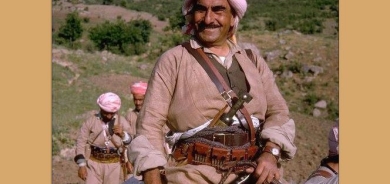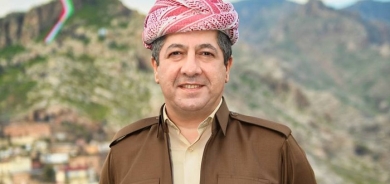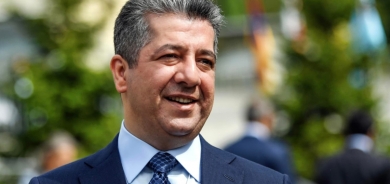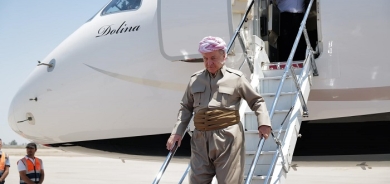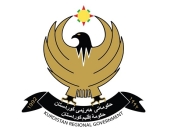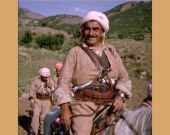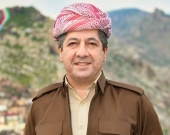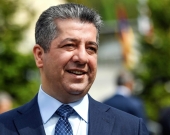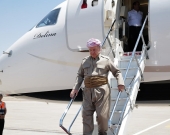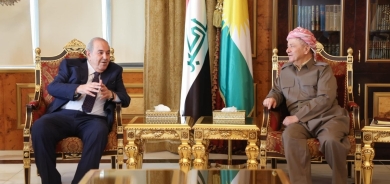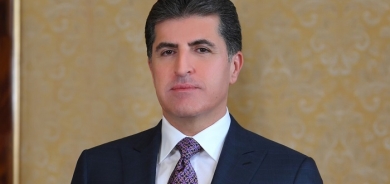Imitating Mohamed Siad Barre makes Iraq like Somalia

Robert I. Rotberg When States Fail
If an analogy is made between Iraq in 2003 when the former regime collapsed and Somalia in 1960, one can see similarities which can be useful for analyzing the situation in Iraq. In 1960, Somalia consisted of two states. One was run by Britian called British Somalia, and the other was run by Italy dubbed Italian Somalia. The two, after announcing independency, became one and united.
In 2003, Iraq was also in two parts. One was monitored and protected under security resolution 688. This safe haven or Iraqi no-fly zones included part of southern Kurdistan, and the other part which included south of Iraq was run by the former Iraqi regime. After the collapse of the regime, the KRG reunited with the other part of Iraq to form a new Iraq and this has been consolidated in the new constitution since 2005.
In Somalia, after the unification of the two parts, elections were made and a new constitution drafted and then voted for and since then there has been a civilian rule there.
After 2003, several elections have been held, a new constitution drafted and voted for, and until 2011 there has been a hope for democratization and a civil ruling.
In late 1969, Mohamed Siad Barre seized power in a coup in Somalia and he justified his action by saying that the politicians made the country worse, and he did the following:
1. He killed and executed politicians saying they were corrupt and unskilled.
2. He suspended the constitution which had been voted for by Somalians.
3. He prohibited political parties in the country.
Like this, Nuri Al-Maliki in Iraq launched a coup in Iraq and justified his action by saying that the Sunni politicians were corrupt and involved in terrorism, so he has done the following since 2011:
1. Directly after American withdrawal, Maliki ordered to arrest Iraqi vice president Tariq Al-Hashimi without prior notice to the president of Iraq, and he arrested his guards and they were executed, but he himself fled to Iraqi Kurdistan then to Turkey.
2. Since Maliki had no power in Kurdistan because of Peshmarga, he couldn’t do what he did in the south. Yet in Baghdad and other cities he restricted political activities for Sunni politicians in particular.
3. For making his coup succeed, Maliki continually created problems for KRG. He used budget and oil as justifications. Then he boycotted parliament.
The dictatorial rule of Mohamed Siad Barre weakened the state of Somalia and it became a failed state, and collapsed inside. Similarly under the rule of Maliki Iraq is stepping towards a collapsed state as it has become weak and failed since 2011.
Iraq, a weak, failed, and collapse state
The concept of failed state or collapse state is not new. Yet the condition varied from time to time and from a state to another. For example if collapsing, weakening, and failing of a state had an impact only of the state itself during the Cold War, now this may have strong impacts on the security and stability of the whole world. Thus, one needs to contextualize and interpret the failed state within the current situations of the world. If in the past a failed state meant that one could not run a state by using force, now this means one is not able to answer the needs of its people and make a balance between its ingredients. So if now a state uses force to resolve the problems, the world will see it as a failed state. North Korea can be seen as an example.
Robert I. Rotberg states:
Modern states focus and answer the concerns and demands of citizenries. They organize and channel the interests of their people, often but not exclusively in furtherance of national goals and values. They buffer or manipulate external forces and influences, champion the local or particular concerns of their adherents, and mediate between the constraints and challenges of the international arena and the dynamism of their own internal economic, political, and social realities.
Based on what Rotberg points out, one can distinguish between weak and strong states by saying that strong states provide political freedom. This is an abstract which helps the citizens create sovereignty and reuse it in constructing a state. That is, reconstructing a state, based on freedom and political contribution, makes it strong and having sovereignty.
Political freedom and contribution will pave the way for predicting the future of a state by citizens, and also have an impact on the citizens’ attitude towards their commitments. These give meanings to the social contract that gathers both a ruler and a ruled. At the same time, it becomes the essence of the system in which both citizens and power influence each for the future of the country. There is a hierarchy among ingredients of political services that states offer. Among them security is the most important. Thus, the content of political service is those codes and mechanisms that together create a base for rule of law.
Before talking about weak states, Robert I. Rotberg talks about characteristics of strong sates, then interpreting the lack of these indicators in weak states, explain the reasons that lead weak states into collapse ones. He concentrates that knowing the reasons will help policy makers to find solutions for it.
Based on Rotberg’s ideas, one can give an explanation for the situation in Iraq:
Iraq is now facing terrible and violent problems inside. The situation is deteriorating day by day. This instability in Iraq shows an example of a failed state to the world and it becomes a safe haven for terrorists. The Sunni Arabs’ attitude towards terrorism depicts the image of a collapse state. That is, they do not help fighting terrorists though they are not with them. Authorities in Iraq are in the hands of elite and these elite submit only to Maliki. This elite is now dubbed ‘Malikians’ in Iraq because even within Shiites they are not liked as it is obvious from disputes between Sadrists and the elite. Maliki’s group are now confused, do not know what to do. So they refuse whatever is good for Iraqis, and trying to delay the elections so that they remain in power more.
In order to incite prejudices among Iraqis, Maliki wants to impose the former regime’s law on KRG regarding gas and oil. Now according to the constitution and political agreements, Maliki’s rule has no validity, even in the eyes of Shiite factions. This situation in Iraq is caused by Maliki’s violation of constitution, which per se leads the state into a weak one, and then to the collapse one.
Iraq as a collapse state
Since the KRG administration was not part of dictatorial Iraq before 2003, the term means collapse, not separate. After seeing the prejudiced and dictatorial behavior of Maliki, President Massoud Barzani has announced to the world in two years that we cannot live with a dictator and Kurdish people should make another decision. Thus, the issue is that Iraq becomes unraveling, which means that there is no balance and the country is a mess. This may open up many possibilities, as Rotberg sees it, and not only has it threatened the region but also the stability and security of the whole world at large. Hence, understanding the collapse state means:
1. There is no democratic competition between factions in Iraq though elections have been held.
2. Now in Iraq court is part of the government, and the government boycotted parliament.
3. Army is used for resolving the political problems.
4. Budget becomes a political issue and is used against Iraqi people and the KRG.
5. Iraq now becomes a site for terrorists, and the government fails to convince people to provide help in this regard. However, anyone who is against Maliki is seen as a terrorist.
These points can be seen as reasons for refusing Maliki’s policies not only inside Iraq, but also outside the country. Prior to everybody, the president, Barzani understands that one should logically deal with this situation in Iraq because it may lead to chaos and instability in the whole region, if it is not stopped. It is important that the international community do not allow impositions being made by Maliki group to divide the country because separation or division should be agreed upon just like the budget and the power, otherwise this may lead to creating violence and instability in the region.
In this complex equation, if the central government thinks rationally and logically, then the KRG will, like what it did before in 2003, play an important role in re-establishing Iraq.
It is important that the U.S.A and its allies admit that Iraq is in a condition of unraveling state. In this regard CNN asked the same question to American administration and government in a green zone in Baghdad. Both answered that it has not reached a collapse state yet. If Americans had admitted this at the time, Iraq would not have reached the present level. Thus, it is important that all the sects and groups in Iraq be convinced that there is such a condition. Then pressure can be put on the Iraqi government and ask the Americans to re-engage in Iraq in order to reconstruct and reestablish the new Iraqi state.
All the political parties in Iraq in general and the National Iraqi Alliance in particular should admit that the federal court is politicized. This court should be independent and not be part of the executive power as it is now.
Returning independency to the federal court is more important than commitment to the constitution. This is because in this case, no one can interpret the constitution according to its interest. Thus, if Iraqis want to resolve this crisis, commitment to the constitution should be done according to the independent federal court, not the current court. All parties should agree that they are committed to what the court interprets regarding constitutional articles.
In the period of elections, since the government is only a caretaker, cannot reestablish a national coalitional government. So it is important that the political parties, watched by Americans, agree upon some principles that prevent monopoly of power under any circumstances. Thus, these veto principles will pave the way for formulating a new government after the elections.
It is important to classify the problems according to their significance. For example, some problems cannot be delayed to after the elections because they relate to the lives of people such as answering the demands of Sunni demonstrators. However, the issue of oil with the KRG and salaries should be separated and dealt with unconnectedly because the oil issue is a long-term problem that can be dealt with by the next government and it needs a law to be passed.
If these steps are taken, the state will return to its weak status, and for releasing out from this, we should return to the process of reconstructing and rebuilding of the state because in the past decade, the concept of weak and strong state have been confused. Now, Maliki has no full control of even the green zone which consists of four miles square. Here, the question is if there is no attempt for stopping the collapse of the state, how will the Kurds deal with the situation and how will the world see Kurds’ decisions in this regard? Answering the question needs to redefine the decision of Kurdish people and the stance of international community towards the Kurds.
The reactions of the international community has been changed a great deal after the Cold War, and then after 2011 because hegemony and super power are no longer acceptable. The states have to cooperate with each other to run the world in the twenty first century. Changes are underway everywhere and states should accept and fit with the changes. Those who run Iraq from the green zone do not realize these changes and still think of international community as if it was a Cold War. President Barzani’s speech at the burial of 93 Barzani tribe Anfal victims on March 2014 comes from his understanding of the changes in the world as he stated “I tell them frankly that we will take such a stance that they have never imagined” because:
1. International community is now dealing with a de facto.
2. Kurdistan Region is a de facto state. This state is a means of stability, security, and peace in the region. If Baghdad deals well with this de fact state, the KRG will become a backbone of strong and democratic Iraq, otherwise the world will not replace the KRG with the weak, collapse, and unraveling Iraq.
3. Oil cannot be used now as a weapon as it was in 1973 during the Ba’eth regime.
4. Ousting Mursi in Egypt has not been seen as a coup by international community because Mursi wanted to be another Bin Laden though he was elected by Egyptians.
5. Another thing which can be considered is the Kurdish dream of independency as compared to French population in Quebec. Although a referendum was held in Quebec for independency and De Gaulle encouraged them to vote for independency, Quebecois decided to remain part of Canada because this was their interests. Yet, our decision for independency can be seen as separation from dictatorship, from tyranny, and from atrocities. And this cannot be seen as separation from Iraq because in the twenty first century sovereignty of a state means freedom, cooperation and coexistence. So if we separated from Iraq, we were still living with Arabs, Turks, and Persians. For example, the KRG relations with neighboring countries are so good that sometimes our citizens do not need visa when they want to go there.
6. Those who think that by our decision to separate from dictatorship, we threaten the unity of Iraq; they have to know that Iraq in its form and unity now is a threat to the international and regional security. So, stepping towards restricting this threat will be welcomed by the world.


